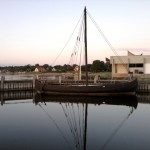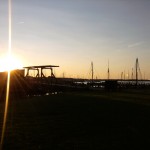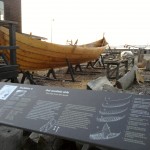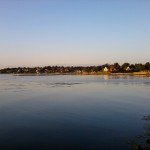According to my planned schedule I should have posted already a week ago. But I didn’t. And before I do not post this week either, I thought I may at least write about why I am not posting. This might actually reveal something about how precarious work in academia goes on. At least I suppose there are others out there facing similar problems.
So, what did I do the last two weeks? After I came back from the PDC 2012 conference I first needed two days off for regeneration. Then I put another two into avoiding to get back to serious work until I thought I just need a good strategy for the next one-and-a-half months in order to write everything down and finish up my thesis. Well, then I thought, before going into that I should just write the report from the PDC 2012 – which I actually already started on the way home. So, I started to look back to what happened at the conference and wrote one or two paragraphs. After that I asked myself if this is right, if I am not misinterpreting what has happened there. I also asked myself what the value of my report is, especially when anyone can anyways watch all the presentations at the conference video archive. Then I thought, if everyone can watch everything, I have to be really accurate in my descriptions. Why, of course I would have to do so otherwise too. But the fact that my report can be scrutinized much more thoroughly (given that anybody reads it in the first place and then still has time to go through the different talks of the conference), made it nearly impossible to write any more – and because there are of course always other much more knowledgeable people who could give much better accounts of the core issues at the conference.
Here, some issues of scientific practice, politics of science and ethico-onto-epistemology are entangled, it seems. In the end it is just a personal report. So, why trying to be objective? What would it mean to do so anyway? Is not the objective-looking impersonal (or impartial) scientific report as much personal? Not necessarily, but it is in the same amount political. Suppose you write a report that highlights the major themes and the core issues (as they would be perceived by the people at the core of the discipline), a report in which you mostly leave out attempts to interpret what has happened, where you just present a selection of what was actually said and discussed, ideally in a well readable form, tied together in a way so that a golden thread leads the reader through the report. This surely would be a great report. It would present the dominant view of (or on – depending on your reference discipline) the field. But what is new in that then? In some sense this report conserves and perpetuates an established understanding, at best it makes it more explicit – pretty normal science as Thomas Kuhn has termed it exactly half a century ago, in his Structure of Scientific Revolutions (for a newer edition see: Kuhn 1996). By the way, in The Observer there is a nice article by John Naughton on the relevance of Kuhns work, in which concludes with the question: “isn’t it time for a paradigm shift?”
So, although I know that I do not want to do normal science and that this is perfectly fine in scientific terms, I cannot find this obviousness, naturalness or self-evidence with which good reports and, also, good scientific papers, seem to be written. Perhaps doing not normal science implies denying to use god-tricks as Donna Haraway has decribed the scientific view-from-nowhere, which supposes the negligibility of the researchers own positions (Haraway 1988; Haraway 1991, 189ff). So while acknowledging this should actually make writing more easy, because it is anyway clear that my report is of course situated in my specific position, I sometimes have the feeling that it actually becomes harder. Why? Because it is expected that I conform to established (objectified or objectifying) standards; because there is nor space or time to make explicit the contingencies of my own working (which I am in fact just doing in some sense with this posting); because I do not get paid for this; in short: because the structural conditions foster normal science.
Ok, back to what I was doing. So, my last two weeks mainly consisted of avoiding, procrastinating, unproductive reflection … ok, here we have another issue. Why is this constant reflecting, rethinking and not-making-a-point unproductive? What does it mean to be productive? Perhaps unproductive is the wrong term. Perhaps it is just pre-productive, a necessary work that is usually embedded in other (daily) routines or even in seemingly scientific idle times of reading or watching this or that, cooking some fancy food, cleaning up the house, playing music, knitting a scarf, or even programming some web tools for a project I am involved in – all those are things I did in the last two weeks. But it all felt so unproductive – except for the programming, which again reflects our societal valuations of different sorts of work that I cannot just strip off (in neither direction of the productive/undproductive-dichotomy). Besides, just as an additional, but socially accepted excuse: I actually also did some other work on articles for a monthly magazine and a brochure. Yes, real work that pays real money which brings in real food and other stuff needed for real living – meaning mostly the part ‘outside’ science/academia.
So, while these pre-productive activities sometimes seem necessary to gain new insights and to critically reflect ones own scientific work, they also might hinder in going forth with scientific production – which is already evident in the wording. This might be just best be explained by the phenomenon of procrastination. As I am no psychologist, and I certainly do not want to start procrastinating again by going into some studies on procrastination, I will stay on a general level here. But this is already the point then: is procrastination always “counterproductive”, “needless” and “delaying”? Would it really mean to procrastinate if I really did stroll off into several studies on this issue for the next few days, just to come back to finish this article later – an article that has (on first sight) not any significant role in context of my actual thesis work? Would it still be procrastination if later take this article up again and discuss it with people to make a real paper out of it? By the way, if you are interested in a collaboration on that, just shoot me an e-mail. Even if we then make a distinction between “pre-productive” activities and “procrastination”, this still doesn’t solve the issue of why not only procrastination but also pre-productive activities often make us feel so bad. I think procrastination as a concept might in some cases indeed help to address some serious blockades and to seek help by others. But research on procrastination seems to almost exclusively frame it as something that hinders us and should be overcome. When we take a step out of this normative frame we could just also focus on what it helps us to do, even if the structural conditions are neglecting its pre-productive status. (P)re-productive work in our society still is exploited work. Even if we go onto one of the major commercial social web platforms to procrastinate, what we are indeed doing without even our own recognition is productive work – although usually not for ourselves but for a company that thrives on this exploitative arrangement, as Christian Fuchs has recently elaborated (Fuchs 2010; Fuchs 2012).
So, while I am not so much into distinguishing procrastination from (other) forms of pre-productive activities, others might want to go into investigating this. If you have any papers or links on that please let me know.
What my point here is: there are a range of pre-productive activities which are devalued in our institutional and societal arrangements. But especially for conducting non-normal, paradigm-shifting science these activities might help a lot, because they give space to new associations and thoughts (sometimes by sheer chance). These spaces can function as apparatuses of diffraction, through which we interpose and juxtapose different kinds of situated knowledges, to come to new insights and valuable translations that are rooted in a world full of socio-material contingencies. Through such diffractions we then are able to come to more (socially) just and robust knowledges, whether in social science, humanities or technical and natural sciences. This is of course not just something I made up. These few lines are very condensed interpretations of Karen Barad’s framework of agential realism (Barad 2007) and Donna Haraway’s work on situated knowledges (Haraway 1991). Especially the concept of diffraction is brought up by both and unfolds its valuable theoretical and methodological implications in the interplay of these works.
But how to come to an end? This is a very practical question for me at the time. How to not go on with this article and rather come back to what I actually should be doing? How can I use those things that I do, when I am just not able to go on with my main work? And do I have to? I do not want at all to glorify procrastination. It actually is much more a burden to me, and I would rather like to find some neatly delimited and especially non-precarious institutional arrangement to work on modest STS, Participatory Design, or computer science projects – being aware that I would not have to wish for such an arrangement, if we finally managed to change how work is defined in our society and how society (including our technoscientific creations) supports for the well-being of its members. But sometimes I think it is ok to be sick of ones own Utopian aspirations, as long as we have others who pull us out of our moods of resignation to engage again in critical counterproductive reflections. So, if you want to join an association of (pre-)productive procrastinators, let me know.
And for all those who are actually interested in my main research: don’t worry! Eventually I will be tired enough of wandering around the fields of curiosity and find back on the busy road of productivity. At least my report on the PDC 2012 is indeed almost finished, and I will publish it as soon as I find the heart to just set aside my own objections to it.
In general I think I already have shifted to the idea of not publishing weekly here, but only every other week. Otherwise I would feel too distracted to go on with my thesis – as this is additional work and not just a 1-to-1 mapping or illustration.
Wow, what an article … at least for a major writer’s block. One day I’ll make a paper out of it, and if it is just for the sake of the neat title. But first lets wonder what brings tomorrow.
References:
Barad, Karen Michelle. 2007. Meeting the Universe Halfway: Quantum Physics and the Entanglement of Matter and Meaning. Duke University Press.
Fuchs, Christian. 2010. ‘Labor in Informational Capitalism and on the Internet’. The Information Society 26 (3): 179–196. doi:10.1080/01972241003712215.
———. 2012. ‘With or Without Marx? With or Without Capitalism? A Rejoinder to Adam Arvidsson and Eleanor Colleoni.’ tripleC – Cognition, Communication, Co-operation 10 (2) (July 1): 633–645.
Haraway, Donna. 1988. ‘Situated Knowledges: The Science Question in Feminism and the Privilege of Partial Perspectives’. Feminist Studies 14 (3): 575–599.
———. 1991. Simians, Cyborgs and Women: The Reinvention of Nature. New York: Routledge.
Kuhn, Thomas Samuel. 1996. The Structure of Scientific Revolutions. 3rd ed. The University of Chicago Press, Chicago. 1st Edition 1962.






